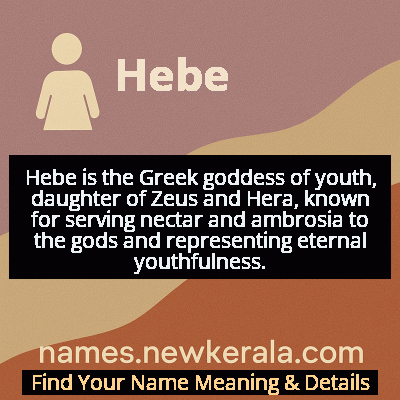Hebe Name Meaning & Details
Origin, Popularity, Numerology Analysis & Name Meaning of Hebe
Discover the origin, meaning, and cultural significance of the name HEBE. Delve into its historical roots and explore the lasting impact it has had on communities and traditions.
Name
Hebe
Gender
Female
Origin
Greek
Lucky Number
2
Meaning of the Name - Hebe
Hebe is the Greek goddess of youth, daughter of Zeus and Hera, known for serving nectar and ambrosia to the gods and representing eternal youthfulness.
Hebe - Complete Numerology Analysis
Your Numerology Number
Based on Pythagorean Numerology System
Ruling Planet
Moon
Positive Nature
Diplomatic, friendly, artistic, empathetic.
Negative Traits
Over-sensitive, moody, indecisive, prone to self-pity.
Lucky Colours
Green, cream, white.
Lucky Days
Monday.
Lucky Stones
Pearl, moonstone.
Harmony Numbers
1, 3, 4.
Best Suited Professions
Diplomats, mediators, caregivers, artists.
What People Like About You
Cooperative spirit, friendliness, artistic talent.
Famous People Named Hebe
Hebe Uhart
Writer
Award-winning Argentine novelist and short story writer
Hebe de Bonafini
Human Rights Activist
Founder of Mothers of the Plaza de Mayo in Argentina
Hebe Camargo
Television Host
Iconic Brazilian television personality for six decades
Hebe Stroess
Actress
Prominent Brazilian actress in telenovelas and films
Name Variations & International Equivalents
Click on blue names to explore their detailed meanings. Gray names with will be available soon.
Cultural & Historical Significance
Throughout Western cultural history, Hebe has served as an artistic muse and symbolic figure. During the Renaissance and Neoclassical periods, she became a popular subject in sculpture and painting, representing ideals of feminine beauty and graceful service. Artists like Antonio Canova created celebrated marble sculptures of Hebe that captured her youthful elegance and symbolic importance. In literature, references to Hebe often evoke themes of eternal youth, beauty, and the serving of divine inspiration. The name continues to carry these rich cultural associations in modern times, connecting contemporary bearers to one of classical mythology's most positive and life-affirming figures.
Extended Personality Analysis
People named Hebe typically exhibit a vibrant, youthful energy that seems to defy chronological age. They often possess an innate grace and natural charm that makes them appealing to others across different social contexts. Their personality tends to blend optimism with practical wisdom - they approach life with fresh enthusiasm while demonstrating mature judgment in important matters. Many Hebes display strong nurturing instincts and derive satisfaction from creating warm, welcoming environments where people feel cared for and valued. They often excel in roles that require diplomacy, hospitality, or caregiving, mirroring the mythological Hebe's role as the gracious hostess of Olympus.
These individuals usually maintain a positive outlook on life and have a remarkable ability to find joy in simple pleasures. Their resilience stems from an inner vitality that helps them bounce back from setbacks with renewed energy. While they may appear carefree, Hebes often possess deep emotional intelligence and intuitive understanding of human nature. They tend to be adaptable and open to new experiences, yet maintain a core stability that others find reassuring. Their combination of youthful spirit and grounded wisdom makes them excellent friends and confidantes who can both lighten moods and provide thoughtful counsel when needed.
Modern Usage & Popularity
In contemporary naming practices, Hebe maintains a distinctive presence as a mythological name that hasn't achieved widespread popularity, preserving its unique character. The name sees most frequent use in Latin American countries, particularly Brazil and Argentina, where cultural figures like Hebe Camargo and Hebe de Bonafini have kept the name in public consciousness. In English-speaking countries, Hebe remains relatively rare but has gained some traction among parents seeking classical names with strong mythological roots that aren't overly common. The name's usage patterns show it's often chosen by educated, culturally-aware families who appreciate Greek mythology and want a name with historical depth and positive associations. While not appearing in most countries' top name lists, Hebe has benefited from the broader trend of revived interest in mythological and classical names. Its short, memorable quality and exclusively feminine association make it appealing to parents looking for names that are both distinctive and easy to pronounce across different languages.
Symbolic & Spiritual Meanings
The name Hebe carries profound symbolic meanings that extend far beyond its literal translation of 'youth.' It represents the eternal human aspiration for renewal, vitality, and the preservation of life's most vibrant qualities. Symbolically, Hebe embodies the concept of perpetual spring - not just in the physical sense, but as a state of mind and spirit. Her mythological role as server of ambrosia symbolizes the nourishment required to maintain not just physical immortality, but spiritual and creative vitality. The name metaphorically suggests someone who brings rejuvenation and inspiration to others, acting as a catalyst for growth and transformation. In psychological terms, Hebe represents the integration of the child's wonder with the adult's wisdom - the ideal balance that allows for continuous learning and adaptation throughout life. The symbolic meaning also encompasses graceful service and the beauty found in caring for others, suggesting that true youthfulness of spirit comes from meaningful contribution and connection. Ultimately, the name symbolizes the hope that the best qualities of youth - curiosity, energy, and openness - can be maintained throughout one's life journey.

